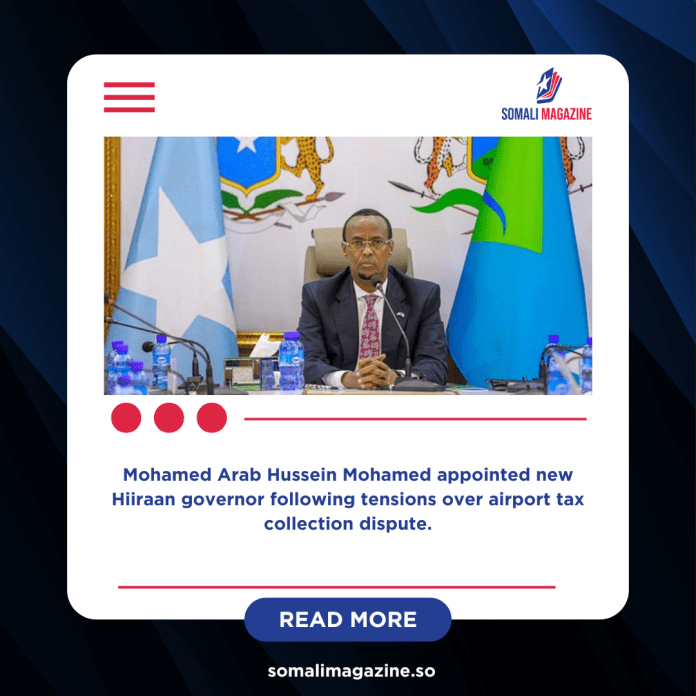Facebook Twitter (X) Instagram Somali Magazine - People's Magazine
Hirshabelle regional state President Ali Abdullahi Hussein Guudlawe has dismissed the governor of Hiiraan region, Muse Salad Wehliye, following growing tensions within the regional administration. In a decree issued on Monday, President Guudlawe appointed Mohamed Arab Hussein Mohamed as the new governor of Hiiraan.
According to a statement from Mohamed Shuuriye Nur, the Director of Communications and Public Relations at the Hirshabelle Presidency, the decision to replace Muse Salad was made based on a recommendation from the region’s Vice President, Yusuf Ahmed Hagar Dabageed. The newly appointed governor, Mohamed Arab, is not new to public service. He previously served as chairman of the Selection Committee for the Federal Parliament representing Hirshabelle during the 2021 elections, a role that gave him experience in regional politics and governance.
The decision to remove Muse Salad reportedly follows weeks of deepening disagreements between him and Vice President Dabageed. Their dispute is said to have centered on the collection of taxes at Ugaas Khaliif Airport in Beledweyne, the capital of Hiiraan region. Sources close to the regional administration suggest that the conflict over revenue management and control at the airport created friction that eventually made it difficult for both officials to work together.
This internal power struggle has drawn attention across the region, as political divisions within Hirshabelle have long been seen as a challenge to its stability and governance. Observers note that the tension between regional leaders often affects the functioning of local administrations, especially in areas like Hiiraan, where government authority is already limited. The regional government in Jowhar has historically struggled to maintain effective control over Hiiraan, with some areas being under the influence of local militias and community groups.
The dismissal of Muse Salad is expected to trigger political reactions, as has happened in previous instances where governors were removed from office. In the past, ousted governors have resisted their dismissal, either by challenging the decision publicly or by rallying local support in defiance of Hirshabelle authorities. Whether Muse Salad will accept the decision or contest it remains unclear, but political analysts believe the issue could deepen existing divisions within the region.
President Guudlawe’s administration has faced several internal challenges since he took office, particularly regarding balancing power among leaders from different clans and regions. The appointment of Mohamed Arab may be an attempt to restore stability and cooperation between the regional government and Hiiraan’s local administration. His political experience and familiarity with Hirshabelle’s governance structures could help ease tensions if he manages to build trust with local communities and address long-standing grievances.
Despite the leadership change, Hirshabelle’s control over large parts of Hiiraan remains weak. Beledweyne, one of the most important cities in central Somalia, has often operated with a degree of autonomy from the regional government. Analysts suggest that the new governor’s success will depend on his ability to navigate local politics, strengthen the presence of regional institutions, and maintain open dialogue with both community leaders and national authorities.
As the situation unfolds, many will be watching closely to see whether the appointment of Mohamed Arab marks a step toward resolving internal disputes or adds to the ongoing political instability in the region. For now, the leadership transition highlights the complex and fragile nature of governance in Somalia’s federal member states, where alliances shift quickly and local power dynamics often determine the effectiveness of administration.

